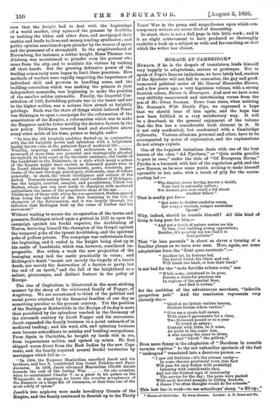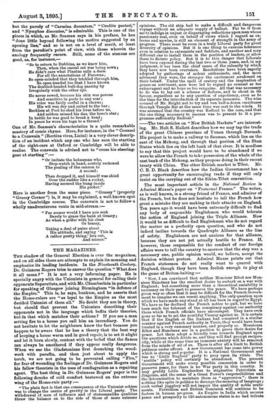HORACE AT CAMBRIDGE.*
HORACE, if he is the despair of translators, lends himself very happily to adaptations, serious or grotesque. Not to speak of Pope's famous imitations, we have lately had, readers
of the Spectator will not fail to remember, the gay and good- humoured political satire of Mr. Graves' Hawarden Horace, and a few years ago, a very ingenious volume, with a strong
Scottish colour, Horace in Homespun. And now we have some very skilfully constructed and entertaining verses from the pen of Mr. Owen Seaman. Some time since, when noticing
Mr. Seaman's With Double Pipe, we expressed a hope that we should hear of him again, and the hope has now been fulfilled in a very satisfactory way. It will be a drawback to the general enjoyment of the volume that the fun has a considerable local element in it. It is not only academical, but academical with a Cambridge differentia. Various allusions, personal and other, have to be accompanied by notes of explanation, and the explanations do not always explain.
One of the happiest imitations deals with one of the best known of the odes, "Ad Pyrrham," or " Quis ranka gracilis te puer in rosa," under the title of "Of Evergreen Sirens." Pyrrha is a barmaid, with hair of the regulation gold, and the new Horace, as he sees some youth seeking to make himself agreeable to her, asks, with a touch of pity for the unsus- pecting lad :—
"Who fancies, never having known a doubt,
Your hair is naturally yellow; Nor dreams you ever cared a bit about Another fellow."
That is neatly put for- " Qui nunc te fruitur credulus aurea,
Qui semper vacua.m, semper amabilem Sperat."
Why, indeed, should he trouble himself? All this kind of thing is long past for him,—
" And yet a touch of nature makes me kin To him, that budding young apprentice; Besides, it's possibly my son that's in
Loco parentis."
That "in loco parentis" is about as clever a turning of a familiar phrase as we have ever seen. Here, again, are some adaptations from the "Sant quos curriculo " :—
"Another lot, by fortune led,
The fervid wheel, the black and red, Will break the bank, or lose their head,"
is not bad for the "meta fervidis evitata rotis," nor
"While some, untutored to be poor, Pursue a claim for precious ore In regions of the martial Boer, And find it rotten,"
for the ambition of the adventurous merchant, "indocilis pauperiem pati." And the conclusion represents very cleverly the-
" Quod si me lyricis vatibus inseres, Sublimi feriam sidera vertice."
"Give me a music-hall career, With signed agreements for a clear, Two thousand pound or so a year To touch as salary ; Content with little, be it mine, As lyrist in the comic line, A star among the stars to shine, And " knock " the gallery."
Even more funny is the adaptation of " Bacchum in remotis carmina rupibus " to the not unfamiliar spectacle of the fast " undergrad " translated into a decorous parson :— "I saw old Dubbin.s—it's the solemn verity—
In some obscure provincial town (the fact Will pass for racy fiction with posterity) Intoning with considerable tact, And not the faintest sign of insincerity
The service for the day ; the pews were packed
With most devoted nymphs in killing bonnets,
A theme I've often thought would do for sonnets."
This last line is weak—to use schoolboys' slang, "a fill-up ; "
• Horace at Cambridg e. By Owen Seaman. London : A. D. Lines and Co.
but the parody of " Carmina docentem," " Credite posteri," and " Nymphas discentes," is admirable. This is one of the pieces in which, as Mr. Seaman says in his preface, he has "done little beyond following the motive suggested by an opening line," and so is not on a level of merit, at least from the parodist's point of view, with those wherein the analogy frequently recurs. Still, some of the stanzas are good, as, for instance,—
" So to return to Dubbins, as we knew him,
• Then, when the casual oat was being sown; He didn't care what Plautus sails a della For all the annotations of Perowne ;
So open-minded that they trickled through him, So open-handed too that I have known The doubled.headed bull-dog passing by Irregularly wink the other eye.
He never rowed, because his skin was porous And sensitive in parts to any scar ; His voice was fairly useful in a chorus ; His wit was dry and suited to the bar ; Reckless at Pool he shed his lives before us, And seldom missed his due, the hero's star ; In battle he was good to break a head ; In peace he wore his toga to a thread."
One of Mr. Seaman's characteristics is a quite remarkable mastery of comic rhyme. Here, for instance, in the "Counsel to a Coxswain" (Rectius vives, Licini) is a very clever descrip- tion of an incident which any one who has seen the starting of the eight-oars at Oxford or Cambridge will be able to realise. The coxswain is advised not to "cross his steering- gear at starting " :—
"Or imitate the helmsman who,
Stop-watch in hand, acutely reckoned The pealing of the cannon to A second; Then dropped it, and himself was shied Over the rudder like a rocket, Having secured the bung inside His pocket."
Here is another from the same piece. "Grassy" (properly "Grassy Corner ") is, it may be explained, a well-known spot in the Cambridge course. The coxswain is not to follow a wholly unadventurous route in mid-stream :—
"Far sooner would I have you seek Barely to graze the bank at Grassy;
As when a golfer with his cleek Or brassy, Taking a deal of pains about His attitude, and saying This is A rather pretty thing,' lets out, And misses."



































 Previous page
Previous page